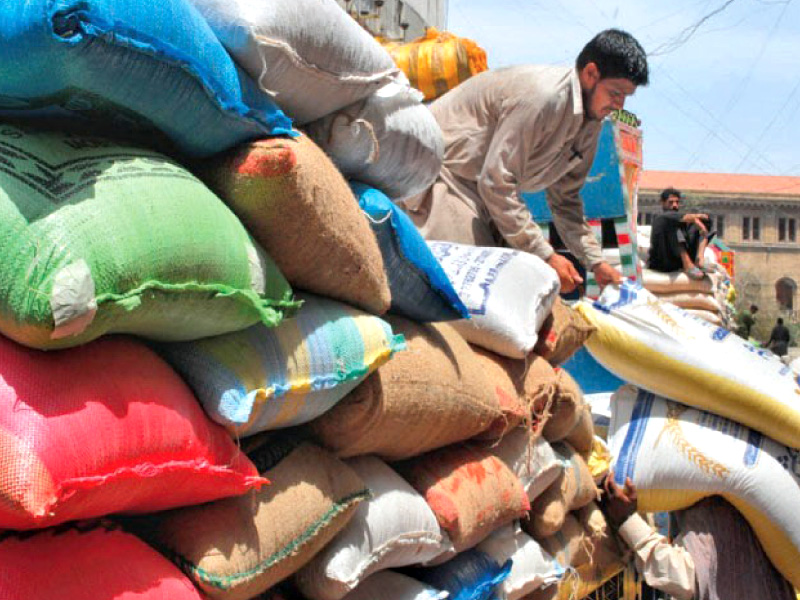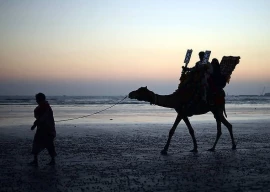
Pakistan is facing hurdles in its efforts to export one million tons of wheat to Iran as part of a barter trade arrangement – a scenario which is the result of sanctions imposed by the United States and the European Union on Tehran for its alleged nuclear programme, denied vehemently by Iran.
According to sources, it will not be possible for Iranian shipping firms, which come under sanctions, to transport wheat from Pakistan. Apart from this, performance guarantees will also be required from banks for export of wheat, but Pakistan’s banks may not be able to issue such guarantees in the face of international restrictions.
Another thing that stands in the way of pushing ahead with the barter trade arrangement is the difference of opinion between Pakistan and Iran over prices. According to sources, Pakistan agreed on the price of $300 per ton for wheat supply – the market price in July 2012 – but Iran insists that Pakistan pay the current price for fertiliser, which Islamabad will import in place of wheat.
An official of the Ministry of Food Security and Research told The Express Tribune that the government had planned to export 100,000 tons of wheat in barter trade in an attempt to clear unpaid bills for power import from Iran.
“Power import bills have exceeded $50 million, we will be able to clear $30 million with the export of 100,000 tons of wheat,” an official of the power ministry said.
Food Security and Research Secretary Ahmed Bakhsh Lehri confirmed that 100,000 tons of wheat would be exported in a government-to-government deal to clear power import dues. However, the remaining 900,000 tons will be shipped by the private sector, where bank performance guarantees will be required.
Lehri dismissed the perception that there was a deadlock over the price issue, saying no major movement had been recorded in prices since July 2012.
Earlier, Iranian inspectors arrived to take samples of wheat for quality inspection. Before that, Iran had expressed concern over the quality of wheat, containing 0.3% karnal bunt (a fungal disease), as Tehran sought the commodity free of fungus.
During negotiations, Pakistan’s officials insisted that 0.3% fungus was not harmful to human health as the internationally acceptable level was higher at 1%. They stressed that wheat was in line with the standards applied in the US and Europe.
Pakistan has a surplus stock of 1.5 million tons of wheat and even after export of one million tons, 500,000 tons will be left in reserves.
In February 2012, then water and power minister Syed Naveed Qamar and visiting Iranian Deputy Commerce Minister Abbas Gohadi agreed that Tehran would import one million tons of wheat as well as 200,000 tons of rice.
In return, Pakistan will purchase iron ore for state-owned Pakistan Steel Mills, a financially-troubled industrial giant because of shortage of raw material and other problems. Pakistan also agreed to import fertiliser to meet domestic demand and arrest rising prices.
Published in The Express Tribune, February 3rd, 2013.
Like Business on Facebook to stay informed and join in the conversation.
COMMENTS (6)
Comments are moderated and generally will be posted if they are on-topic and not abusive.
For more information, please see our Comments FAQ










































@Sophist: . You stated I hope you know they are exporting fertilizer to Iran, not to Afghanistan . From the Article : I hope you know they are exporting fertilizer to Iran, not to Afghanistan. . As such the Iranians are Exporting the Fertilizer to Pakistan and so it falls on Pakistan to Tightly Regulate the distribution and use of the Fertilizer by Pakistanis. . Cheers
Barter deals are not complicated -- you agree on a value - you inspect the product to insure it's what your trading for - you trade the property - shake hands and call it a day. Pretty clear that there is no trust between Pakistan and Iran and the lack of currency makes the deal tougher because it's hard to give std bribes/kickbacks without currency.
Well how about using this surplus to reduce the price of Atta for the poor.
@Pops: I hope you know they are exporting fertilizer to Iran, not to Afghanistan.
Most of the fertiliser will be used to make explosives. It should be tightly regulated.
Either there is something more that has not been disclosed or that Iran is giving a bad deal to Pakistan.